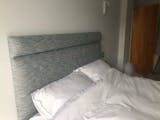Can sleeping on a bad mattress cause shoulder pain?
Starting your day feeling refreshed following a great night’s sleep is an energising feeling. With all your muscles rested and relaxed you’ll feel invigorated and ready to enjoy your day. Unfortunately, this isn’t the case for everyone. People who experience shoulder pain will rarely wake from sleep feeling fighting fit, but struggle from their beds often needing to take pain killers before they can begin the day. While you might wonder if you’ve been sleeping in an awkward position overnight or run through yesterday’s activities, trying to work out how you strained your muscles, another question might arise: Can sleeping on a bad mattress cause shoulder pain?
If you favour sleeping on your side and are experiencing shoulder pain, read on to discover the relation between your discomfort and the surface you sleep on. Your choice of bedroom furniture can have a significant impact on your situation.
Exploring the reasons for sore shoulders
Aching shoulders can be caused by a wide variety of different conditions. A common reason is rotator cuff injuries where the muscles, tendons and shoulder joints of the rotator cuff have become strained or torn leading to dull aches that make sleeping on your shoulder without considerable pain impossible.
Shoulder bursitis is another reason. When the fluid sac that protects your rotator cuff tendons, called the bursa, becomes inflamed it causes swelling, redness, and pain.
Frozen shoulders can also make joints become stiff and painful. This is often more so at night, making a restful night unattainable and leaving sufferers uncomfortable in the morning.
Shoulder impingement syndrome involves your shoulder bones encroaching on the tendons or bursa which can cause your arm to become weak. Like a frozen shoulder, the pain will often get worse at night-time.
Why does your shoulder hurt more after sleeping?
Shoulder blade pain is commonly more acute during the night and in the morning. This is for two reasons. In the daytime you are busier and distracted by activities but at night, your mind is free to focus on the pain. Also, as noted by the NHS one of the best remedies for shoulder pain is to remain active and to gently exercise the joint. Overnight, you will often lie in one position for hours and your shoulder may stiffen up, becoming more painful by morning.
Is your mattress really causing your shoulder pain?
People who sleep on their side enjoy numerous benefits. The position can be ideal for easing snoring as well as acid reflux, is excellent for spine alignment and will often be helpful for those with digestive issues. However, given the position they prefer, many side sleepers erroneously believe that it may be the cause of their shoulder pain. In fact, it is often the type, quality or age of the mattress being slept on that is to blame for sore muscles and joints when they wake.
If a mattress can’t offer sufficient pressure relief, delicate areas like the shoulder are put under unnecessary strain. Pains experienced during the night or encountered when you wake up can be caused by a mattress being too soft, but a mattress that is too firm can also be problematic depending on your symptoms.
If you suffer from shoulder pain and are considering purchasing a new mattress, consulting a GP who is aware of your condition can be a wise move.
What mattresses are not ideal for shoulder pain?
While you might think a modern memory foam mattress sounds ideal, fitting to the contours of your body, it may not be suitable for a side sleeper. While exceptionally comfortable and useful when you don’t want to disturb your partner sleeping beside you, memory foam may offer little pressure relief.
A memory foam mattress allows you to sink into the surface but will compress your shoulder and can create further discomfort. This can make these mattresses unsuitable if you are already experiencing shoulder pain.
Can sleeping on a bad mattress cause shoulder pain?
Put simply, the answer is yes. A number of medical studies have been undertaken to assess the relationship between muscular pain and sleeping surfaces. The overall verdict obtained from findings showed that it was possible to mitigate pain and ease sleep discomfort by selecting appropriate mattresses based on a sleeper’s preferred position overnight.
While every individual’s needs are different, firm to medium firm mattresses both tested well in the studies with sleepers confirming an increased number of nights per week without discomfort. Many mattress options are specifically designed to absorb pressure like coiled spring solutions. These mattresses can effectively spread out the pressure, offering cushioned support for the limbs of sleepers and making for a more restful night’s sleep.
As mattresses get older, the weight of our bodies can take their toll on them. When mattresses have been badly manufactured, they may weaken quicker. While high-quality foam and pocket spring mattresses are built to last, more conventional and less costly mattresses can soon become less supportive. Springs can become compressed or displaced in pressure areas causing them to sag, in the very places where support is needed most.
For this reason, experts recommend that mattresses should be changed every six to eight years to continue offering optimum support.
Made to measure mattresses
Whether you’re looking for pocket sprung or extra-firm options we have a multitude of high-quality mattresses that can provide the additional support you need. You can browse our select range of bespoke mattresses here at Endurance Beds to find your ideal solution or, if you require further advice to work out the perfect type of mattress for your needs simply get in touch with our expert team today for assistance.







